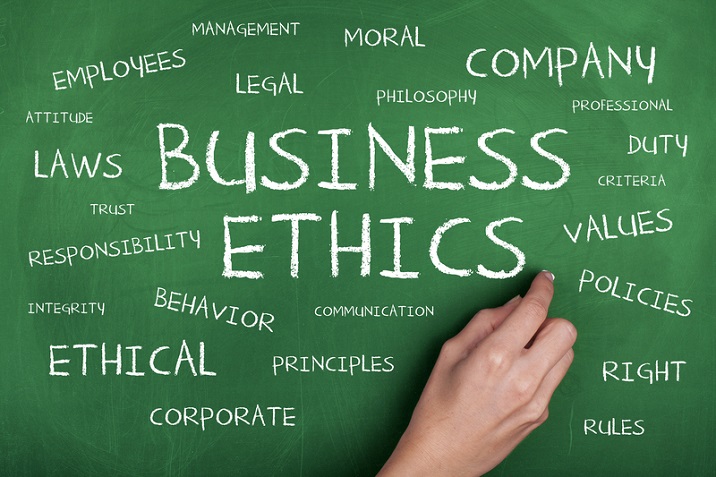Business Ethics Social Responsibility Definition
Business Ethics - Introduction
Ethics is a subject of social science that is related with moral principles and social values. 'Business Ethics' can be termed as a study of proper business policies and practices regarding potentially controversial issues, such as corporate governance, insider trading, bribery, discrimination, corporate social responsibility, and fiduciary responsibilities.
Businesses must abide by some basic principles. It should provide quality goods and services at reasonable prices to their consumers. It must also avoid adulteration, misleading advertisements, and other unfair malpractices.

A business must also perform other duties such as distributing fair wages, providing good working conditions, not exploiting the workers, encouraging competition, etc.
Business Ethics – Definition
There are many definitions of business ethics, but the ones given by Andrew Crane and Raymond C. Baumhart are considered the most appropriate ones.
According to Crane, "Business ethics is the study of business situations, activities, and decisions where issues of right and wrong are addressed."
Baumhart defines, "The ethics of business is the ethics of responsibility. The business man must promise that he will not harm knowingly."
Features of Business Ethics
There are eight major features of business ethics −
-
Code of Conduct − Business ethics is actually a form of codes of conduct. It lets us know what to do and what not to do. Businesses must follow this code of conduct.
-
Based on Moral and Social Values − Business ethics is a subject that is based on moral and social values. It offers some moral and social principles (rules) for conducting a business.
-
Protection to Social Groups − Business ethics protect various social groups including consumers, employees, small businesspersons, government, shareholders, creditors, etc.
-
Offers a Basic Framework − Business ethics is the basic framework for doing business properly. It constructs the social, cultural, legal, economic, and other limits in which a business must operate.
-
Voluntary − Business ethics is meant to be voluntary. It should be self-practiced and must not be enforced by law.
-
Requires Education & Guidance − Businessmen should get proper education and guidance about business ethics. Trade Associations and Chambers of Commerce should be active enough in this matter.
-
Relative Term − Business ethics is a relative term. It changes from one business to another and from one country to another.
-
New Concept − Business ethics is a relatively newer concept. Developed countries have more exposure to business ethics, while poor and developing countries are relatively backward in applying the principles of business ethics.
Principles of Business Ethics
The principles of business ethics are related to social groups that comprise of consumers, employees, investors, and the local community. The important rules or principles of business ethics are as follows −
-
Avoid Exploitation of Consumers − Do not cheat and exploit consumer with measures such as artificial price rise and adulteration.
-
Avoid Profiteering − Unscrupulous business activities such as hoarding, black-marketing, selling banned or harmful goods to earn exorbitant profits must be avoided.
-
Encourage Healthy Competition − A healthy competitive atmosphere that offers certain benefits to the consumers must be encouraged.
-
Ensure Accuracy − Accuracy in weighing, packaging and quality of supplying goods to the consumers has to be followed.
-
Pay Taxes Regularly − Taxes and other duties to the government must be honestly and regularly paid.
-
Get the Accounts Audited − Proper business records, accounts must be managed. All authorized persons and authorities should have access to these details.
-
Fair Treatment to Employees − Fair wages or salaries, facilities and incentives must be provided to the employees.
-
Keep the Investors Informed − The shareholders and investors must know about the financial and other important decisions of the company.
-
Avoid Injustice and Discrimination − Avoid all types of injustice and partiality to employees. Discrimination based on gender, race, religion, language, nationality, etc. should be avoided.
-
No Bribe and Corruption − Do not give expensive gifts, commissions and payoffs to people having influence.
-
Discourage Secret Agreement − Making secret agreements with other business people to influence production, distribution, pricing etc. are unethical.
-
Service before Profit − Accept the principle of "service first and profit next."
-
Practice Fair Business − Businesses should be fair, humane, efficient and dynamic to offer certain benefits to consumers.
-
Avoid Monopoly − No private monopolies and concentration of economic power should be practiced.
-
Fulfil Customers' Expectations − Adjust your business activities as per the demands, needs and expectations of the customers.
-
Respect Consumers Rights − Honor the basic rights of the consumers.
-
Accept Social Responsibilities − Honor responsibilities towards the society.
-
Satisfy Consumers' Wants − Satisfy the wants of the consumers as the main objective of the business is to satisfy the consumer's wants. All business operations must have this aim.
-
Service Motive − Service and consumer's satisfaction should get more attention than profit-maximization.
-
Optimum Utilization of Resources − Ensure optimum utilization of resources to remove poverty and to increase the standard of living of people.
-
Intentions of Business − Use permitted legal and sacred means to do business. Avoid Illegal, unscrupulous and evil means.
Follow Woodrow Wilson's rules − There are four important principles of business ethics. These four rules are as follows −
-
Rule of publicity − According to this principle, the business must tell the people clearly, what it tends to do.
-
Rule of equivalent price − The customer should get proper value for their money. Below standard, outdated and inferior goods should not be sold at high prices.
-
Rule of conscience in business − The businesspersons must have conscience while doing business, i.e. a morale sense of judging what is right and what is wrong.
-
Rule of spirit of service − The business must give importance to the service motive.
Example of Unethical Business Practices
Satyam Computers, a global IT company, was defamed in a notorious list of companies involved in fraudulent financial activities. The list includes names such as Enron, WorldCom, Parmalat, Ahold, Allied Irish, Bearings and Kidder Peabody.
Satyam's CEO, Ramalinga Raju, accepted his role in a broad accounting impropriety that had overstated the company's net revenue and profit. The company had earlier reported a cash reserve of approximately $1.04 billion that actually existed only in books but not in reality.

In his letter to his board, exposing the fraud, Satyam's Raju showed the propensity of the fraud. He stated that, "What started as a marginal gap between actual operating profits and ones reflected in the books of accounts continued to grow over the years. It has attained unmanageable proportions. …"
Later, he described the process as "like riding a tiger, not knowing how to get off without being eaten."
Business Ethics Social Responsibility Definition
Source: https://www.tutorialspoint.com/business_ethics/business_ethics_introduction.htm
0 Response to "Business Ethics Social Responsibility Definition"
Postar um comentário